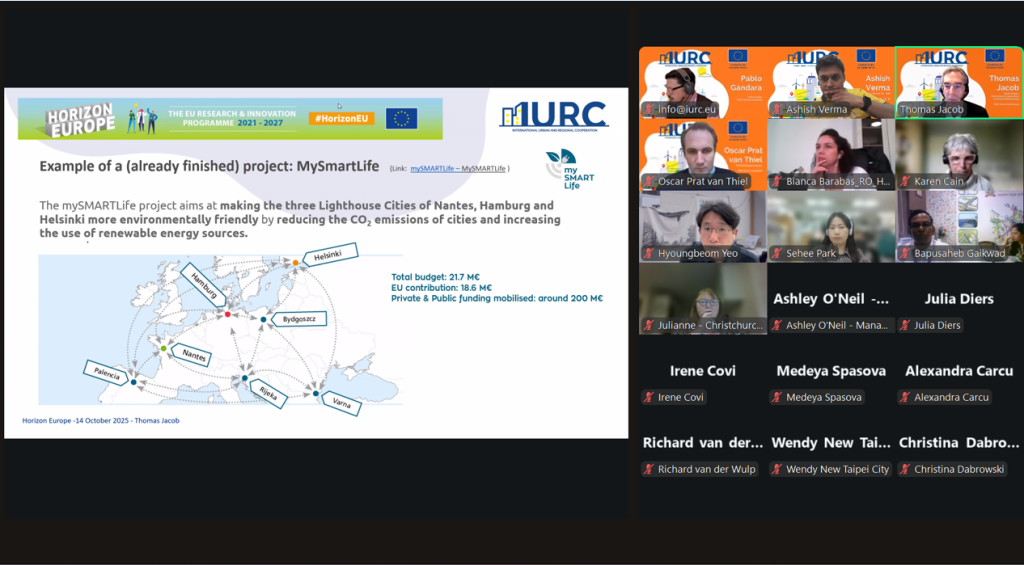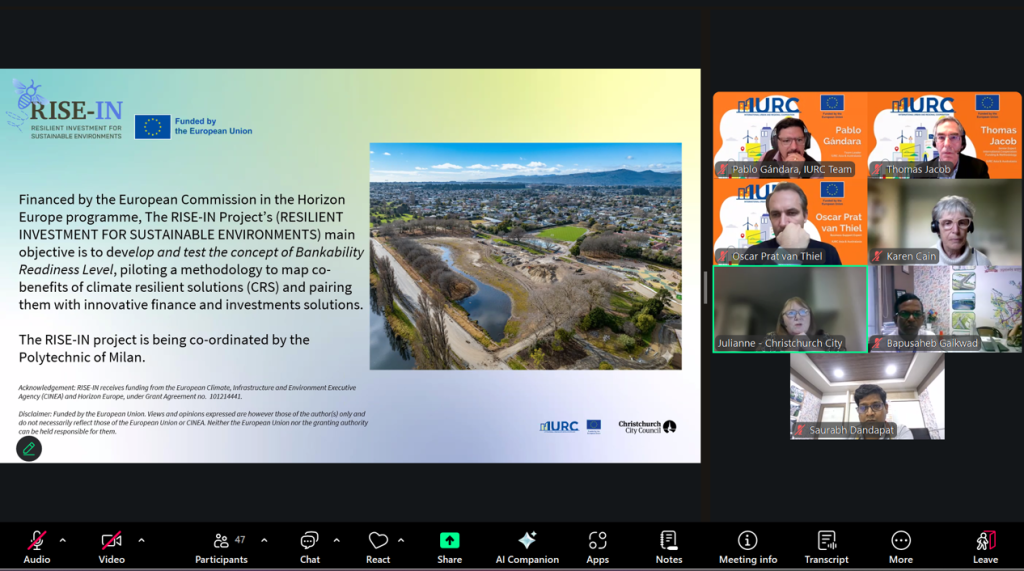The International Urban and Regional Cooperation (IURC) programme hosted a successful webinar on Horizon Europe – Opportunities for IURC Pilot Cities and Regions, bringing together around 50 participants from Europe, Asia, and Australasia. The session explored how local and regional governments can engage in the EU’s flagship research and innovation programme to foster global partnerships and sustainable urban development. The webinar was moderated by Pablo Gándara, IURC Team Leader, who highlighted Horizon Europe’s potential to advance city-to-city and region-to-region collaboration through innovation.
Understanding Horizon Europe
Thomas Jacob, IURC Senior Expert for International Cooperation, Funding and Methodology, delivered a detailed overview of Horizon Europe, a €95.5 billion EU framework programme supporting research and innovation from 2021 to 2027. He outlined the programme’s structure, key thematic clusters (including health, climate, mobility, and digital transformation), and the diverse opportunities for participation—both for EU and non-EU partners.
He emphasised how IURC cities and regions can integrate international collaboration into their development strategies, sharing examples such as MySmartLife and FORCE, which demonstrated the real-world benefits of cross-border innovation partnerships. Jacob also provided guidance on identifying relevant calls, building strong consortia, and preparing proposals for the 2026–2027 work programme cycle.
The programme is open to EU-based organisations, as well as those from associated countries such as New Zealand, Republic of Korea, and potentially Japan and Australia, which are in the process of association. Other countries (e.g. India, Singapore) can participate under certain conditions, particularly when their expertise or resources are essential to a project. They can also be included as partners in a project consortium led by an EU or Associated Country.
Thomas referred to the Draft Work Programmes on Pillat II – Global Challenges and European Industrial Competitiveness.

Christchurch Case Study: Demonstrating Global Impact
Julianne Hughey, City Initiatives Lead, Smart Christchurch, presented a compelling case study on Christchurch’s participation in the Horizon Europe programme following New Zealand’s association in 2023. Through IURC connections, Christchurch joined the RISE-IN Project (Resilient Investment for Sustainable Environments), coordinated by the Polytechnic of Milan and financed by the European Climate, Infrastructure and Environment Executive Agency (CINEA) under Horizon Europe. The project pioneers the concept of “Bankability Readiness Levels”—a methodology to map the co-benefits of climate-resilient solutions (CRS) and align them with innovative finance and investment mechanisms.
As a demonstrator city, Christchurch will lead two pilot initiatives in the Ōtākaro Avon River Corridor (OARC):
-
Soil enrichment to boost carbon sequestration, and
-
Renewable harvesting of native species to support a sustainable biomaterials sector.
The OARC serves as a living laboratory, where post-earthquake land subsidence has accelerated the effects of sea level rise—providing a natural testbed for resilience strategies that could guide other regions facing similar challenges.
Julianne encouraged all IURC pilot cities and regions to leverage the IURC activities by participating in Horizon Europe.

Interactive Exchange and Next Steps
The webinar concluded with an interactive discussion moderated by Pablo Gándara, followed by a short presentation by Oscar Prat introducing IURC’s Business Engagement component. Participants discussed potential partnerships, funding pathways, and upcoming opportunities, including networking sessions planned during the Smart City Expo World Congress in Barcelona (November 2025).
The session demonstrated how IURC’s global network can bridge cities and regions across continents to engage in EU-funded innovation, fostering practical collaboration for a more sustainable and resilient urban future.
